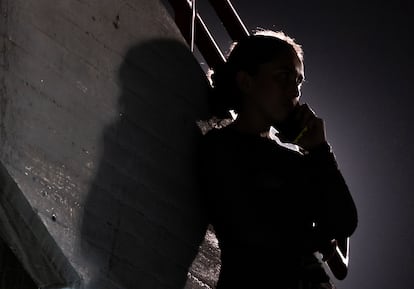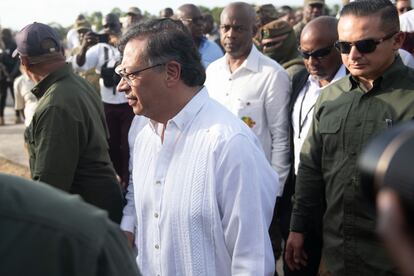A border in flames: Petro and Maduro accuse each other over conflict that has displaced thousands
Bogotá insinuates that Caracas provides cover for the ELN guerrillas and Chavismo responds by accusing the Colombian authorities of sheltering members of Tren de Aragua


Gustavo Petro gripped the lectern with both hands on Wednesday. His nasal delivery was due to an ongoing bout of influenza. He asked himself, before a silent audience, how the National Liberation Army (ELN) guerrillas had gathered such a large number of fighters on the border this week without anyone having detected them. On foot? Impossible, it would take months to cross the mountains. In vehicles? People would have seen them driving through the villages. In reality, the president played the innocent. There is no mystery about how the guerrillas gathered in the kingdom of the coca leaf to massacre their enemies. The intelligence services knew it, the president knew it, of course. They had taken the most direct route to get from one point to another: Venezuela.
The Colombian government has long known that the Venezuelan army coexists with the ELN in the border area, according to official sources consulted. The guerrilla organization carries out operations on Colombian soil and controls part of some regions, but its commanders hide out in Venezuela. This cohabitation became, at least on one occasion, a military alliance: In 2021, the Bolivarian Armed Forces launched a brutal offensive against the FARC dissidents, practically eradicating them from their territory. They also ended the presence of a paramilitary group from Cali, which did business with drug trafficking cartels.
Nicolás Maduro thus put an end to an obsession that was also keeping the people around him awake at night. The Venezuelan president suspected that Iván Duque, Petro’s predecessor, was preparing an invasion with Colombian paramilitaries to overthrow him, with the collaboration of the United States. The ELN, in a scenario like that, would become an ally of Chavismo. The leaders of this guerrilla group have abandoned the idea of taking power by means of arms; they know that there is no way to achieve it at this point but they justify their fight by saying that they are doing it in defense of what they term the “Global South,” of defending threatened peoples like the Palestinians, the Kurds and, of course, Venezuelans — or rather Chavismo, in a broad sense.

The massacre carried out by the ELN in Catatumbo, on the border, has placed Petro and Maduro in an uncomfortable situation. An apocalyptic air surrounds the dividing line between the two nations. The ELN’s battle against one of the dissident groups of the extinct FARC has been joined by the deployment of Colombian troops and Venezuelan military operations, with helicopters and fighter planes flying overhead. Maduro has sent Chavismo’s number two, Diosdado Cabello, to the area. He has reported back to the self-proclaimed president by the minute, using a black cellphone that he displayed in public. Petro has announced a state of emergency in the face of what he considers a serious threat to the nation. Asassinations with a shot to the forehead and exchanges of fire have occurred over the past few days. The dead have been transported in wheelbarrows.
Petro has been deliberately ambiguous when speaking about what is happening, but the insinuation that Caracas is sponsoring the guerrillas has been almost explicit. “The actions of the ELN are not actions that are only due to the internal armed conflict. It is a deadly strategy that endangers national sovereignty,” he said when addressing the issue Wednesday. He added: “The current power of the ELN is not achieved internally. The weakening of the ELN and the empowerment of the population of Catatumbo is essential to maintain our sovereignty.”
The Colombian president’s words have been received as an insult by Chavismo. “That man is a zombie, he has destroyed all his prestige. There is nothing remaining of the leftist person that he was,” a source from the Chavista high command told EL PAÍS. Maduro’s entourage claims that Petro, a former guerrilla himself, “has been broken,” that he is “afraid” of the United States. These accusations are part of the Chavistas’ usual arsenal when referring to anyone they consider a temporary enemy. These criticisms have not only been made on WhatsApp, in private. Attorney General Tarek William Saab, whom Maduro has entrusted with leading a reform of the Constitution, has come out to confront Petro indirectly. “We have discovered how many of these subjects (from the Tren de Aragua, a Venezuelan criminal gang that has expanded throughout Latin America) have taken refuge in Colombia, where it seems that the police agencies do not look, do not see what is happening around them.”
No one anticipated this turn of events. Petro had focused on stopping the violence in Catatumbo, where there are dozens of dead — a number still impossible to determine — and more than 25,000 displaced people in what social organizations already consider a humanitarian catastrophe. And suddenly he finds himself in a confrontation with Chavismo, with whom the bilateral relationship has been tense following Colombia’s decision not to recognize Maduro’s self-proclaimed victory at the polls. Offended, the Venezuelan top brass privately claims that Colombia is “a failed state” and that its president has no legitimacy to demand anything from them. Amid this diplomatic crisis, an armed conflict of large proportions. The border between the two countries continues to burn.
Sign up for our weekly newsletter to get more English-language news coverage from EL PAÍS USA Edition
Tu suscripción se está usando en otro dispositivo
¿Quieres añadir otro usuario a tu suscripción?
Si continúas leyendo en este dispositivo, no se podrá leer en el otro.
FlechaTu suscripción se está usando en otro dispositivo y solo puedes acceder a EL PAÍS desde un dispositivo a la vez.
Si quieres compartir tu cuenta, cambia tu suscripción a la modalidad Premium, así podrás añadir otro usuario. Cada uno accederá con su propia cuenta de email, lo que os permitirá personalizar vuestra experiencia en EL PAÍS.
¿Tienes una suscripción de empresa? Accede aquí para contratar más cuentas.
En el caso de no saber quién está usando tu cuenta, te recomendamos cambiar tu contraseña aquí.
Si decides continuar compartiendo tu cuenta, este mensaje se mostrará en tu dispositivo y en el de la otra persona que está usando tu cuenta de forma indefinida, afectando a tu experiencia de lectura. Puedes consultar aquí los términos y condiciones de la suscripción digital.








































